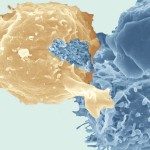Lien vers Pubmed [PMID] – 30312301
Lien DOI – 10.1371/journal.pntd.0006832
PLoS Negl Trop Dis 2018 10; 12(10): e0006832
Human T-Lymphotropic Virus type 1 (HTLV-1) is a human oncoretrovirus that infects at least 5 to 10 million people worldwide and is associated with severe diseases. Africa appears as the largest HTLV-1 endemic area. However, the risk factors for the acquisition of HTLV-1 remain poorly understood in Central Africa.We conducted an epidemiological survey between 2013 and 2017, in rural areas of 6 provinces of Gabon, in a rainforest environment. Epidemiological data were obtained and blood samples were collected after informed consent. Plasma were screened for HTLV-1 antibodies by ELISA and the positive samples were then tested by Western blot (WB). Genomic DNA derived from buffy-coat was subjected to two semi-nested PCRs amplifying either HTLV-1 env gene or LTR region fragments.We recruited 2,060 individuals over 15 years old, including 1,205 men and 855 women (mean age: 49 years). Of these, 299 were found to be ELISA HTLV-1/2 seropositive. According to WB criteria, 136 were HTLV-1 (6.6%), 25 HTLV-1/2 (1.2%) and 9 HTLV seroreactive (0.4%). PCR results showed that 146 individuals were positive for at least one PCR: 104 for the env gene and 131 for the LTR region. Based on both serological and molecular results, 179 individuals were considered infected with HTLV-1, leading to an overall prevalence of 8.7%. The distribution of HTLV-1 infection was heterogeneous across the country. Based on multivariable analyses, female gender, increasing age, ethnicity (Pygmy) and multiple hospitalizations (more than 5 times) were found to be independent risk factors for HTLV-1 infection. Furthermore, a non-human primate bite appeared to be marginally associated with a higher risk of HTLV-1 infection.Based on state-of-the-art serological and molecular methods, we have demonstrated that rural adult populations in Gabon are highly endemic for HTLV-1. Our results regarding risk factors should lead to public health actions aiming to reduce HTLV-1 transmission.



